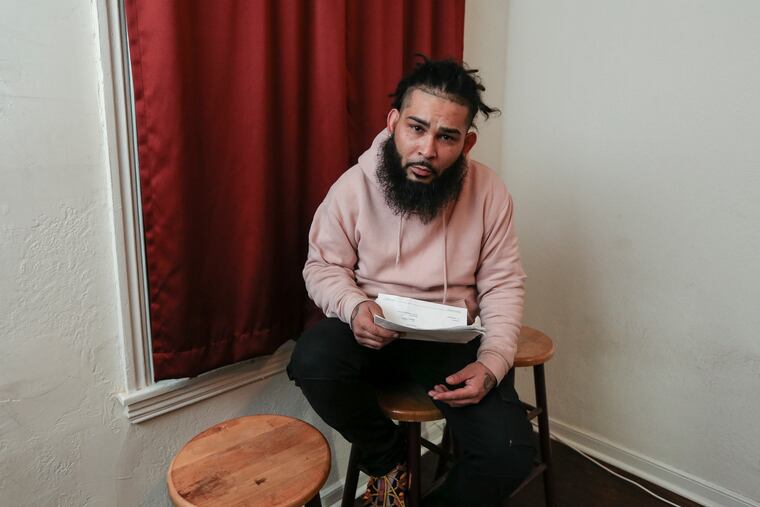Shot and left for dead, a gunshot victim feels revictimized by the agencies charged to help | Helen Ubiñas
“I shouldn’t be in this situation but dammit, I’m here…and I need help."

We sure have a warped way of treating victims around here.
Remember Luis Berrios, the gun-violence survivor I wrote about last year who penned a letter of forgiveness while he was still fighting for his life at Temple University Hospital addressed to the men who shot him during a botched robbery?
Once out, still in pain and dependent on a cane to get around, he limped around his Hunting Street neighborhood to pass out the letter.
Even if the shooters never saw it, Berrios, 36, wanted to spread the message of forgiveness.
But forgiveness doesn’t pay the bills — and Berrios’ keep piling up.
Berrios knows he’s been more fortunate than most of the city’s crime victims. Bosses at his old job at a technical training school have generously cut him a few checks, and some of our readers have donated to his GoFundMe page.
The state’s Victims Compensation Assistance Program awarded Berrios about $15,000 to be doled out in several installments that would help him make ends meet. The first two checks showed up at his house without any hiccups, though (and this will become important a little later) he noticed that paperwork accompanying his second check included his Social Security number.
Berrios grew worried in June, when a third check — for $4,502.73 — didn’t arrive as scheduled. He contacted VCAP and his victim advocate from Congreso de Latinos Unidos.
But when he suggested that the agency stop payment on the check and issue a new one, he says VCAP told him it wouldn’t typically pay the $20 or so for what was likely just some bureaucratic holdup.
And then in July, he was told the check was cashed.
“Not by me,” he recalled telling VCAP.
VCAP sent him a letter with a copy of the check, and the location where it was cashed. Berrios followed the address to a check-cashing store on North Fifth Street.
There, Berrios says an employee showed images of the information reviewed before cashing the check: a document with Berrios’ address and Social Security number, and a driver’s license.
Berrios scrutinized the driver’s license photo. It was another man. And then he realized that it would have been easy for this scammer to get his Social Security number; it was included in that second packet VCAP used to mail out the checks.
Berrios filed a police report, never guessing that he was about to board the roller coaster of revictimization.
He signed an affidavit swearing he hadn’t cashed the check. VCAP told him an investigation would take six to eight weeks. It’s been six months, with Berrios left feeling as if he was forced to be investigator and advocate. Desperate, he finally reached out to me.
Berrios was worried about his bills, but something else was gnawing at him, he told me when I visited him recently. It’s the stress and trauma that he thought he’d sidestepped by forgiving the men who hurt him, but that he can’t escape in nightmares where he’s back out on his front steps, left for dead Nov. 12, 2018. He is desperate to move.
Meanwhile, he says he found it difficult to get in touch with advocates at VCAP and Congreso, leaving him to wonder, “Who is advocating for me?”
In November, VCAP told him the investigation was over and the check was cashed correctly. Berrios was stunned.
“You’re accusing me of stealing my own money," he recalled telling a supervisor. “Not only did this person steal my check, he stole my identity.”
After Berrios pressed a supervisor at VCAP, they — kinda, sorta, maybe? — reopened the investigation. But they couldn’t reissue a check until they were reimbursed by the bank, putting Berrios right back on that roller coaster.
I had questions — chief among them why VCAP didn’t just pay the $20 to stop payment on the check.
VCAP manager Stacie Bredlinger would only say that once the agency is made aware of a problem, it initiates a fraud investigation. Where Berrios’ case stands, she wouldn’t say.
In an email, a Fulton representative, Nicole Wamsley, said: “The bank is not in a position to comment on what appears to be a pending criminal investigation.”
As for Congreso, a spokesperson disputed Berrios’ account of its advocate’s lack of advocating, saying that staffers had continued contact with him and VCAP. And then I was asked to give Congreso a heads-up if I was going to name any employee in my column, “so that we can support our staff internally.”
By all means, let’s prioritize the support of victim advocates over actual victims.
“I fought for my life,” Berrios said, “and now I have to fight for money that is owed to me. I’m tired of fighting. I’m tired of fighting organizations that are supposed to be there for you, that make you feel like you’re asking for a handout."
At this, he broke down in tears.
“I shouldn’t be in this situation, but dammit, I’m here … and I need help."
.